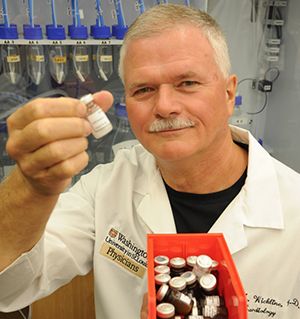Dec 5 2014
Samuel A. Wickline, MD, has been chosen to receive the Chancellor’s Award for Innovation and Entrepreneurship at Washington University in St. Louis.
 Samuel Wickline, MD, is being honored for his entrepreneurial work in nanomedicine. Credit:Robert Boston
Samuel Wickline, MD, is being honored for his entrepreneurial work in nanomedicine. Credit:Robert Boston
Wickline, the James R. Hornsby Family Professor of Biomedical Sciences, will be presented with the honor at the Faculty Achievement Awards ceremony, Saturday, Dec. 6, in Knight Hall.
Faculty achievement awards also will be presented to David A. Balota, PhD, professor of psychology in Arts & Sciences and professor of neurology at the School of Medicine, and Steven L. Teitelbaum, MD, the Wilma and Roswell Messing Professor of Pathology and Immunology and a professor of medicine.
Balota will receive the Arthur Holly Compton Faculty Achievement Award, and Teitelbaum will receive the Carl and Gerti Cory Faculty Achievement Award. Visit here to read an earlier article about their achievements.
The Chancellor’s Award for Innovation and Entrepreneurship is given to faculty members whose research has led to the development of an idea or business that has brought great benefit to others.
“Dr. Wickline has been making prominent and pioneering contributions to research in nanotechnology that have applications across a broad spectrum of medical specialties,” said Washington University Chancellor Mark S. Wrighton. “He has explored new ways to use nanoparticles to address conditions as diverse as atherosclerosis, cancer, muscular dystrophy and HIV. His work also has led to a number of local biotechnology startup companies, making him an outstanding selection for this award.”
Wickline joined the School of Medicine faculty in 1987. He later became director of the cardiovascular division at Jewish Hospital and co-director of the cardiovascular division at Barnes-Jewish Hospital. He began the School of Medicine’s first clinical program in stress echocardiography and developed one of the first cardiac MRI training and research programs in the country.
Wickline was instrumental in establishing the graduate program in biomedical engineering and initiated the university’s first graduate degree-granting program in cardiovascular biomedical engineering.
Much of Wickline’s work focuses on developing nanotechnology for use in medicine. Wickline and his colleagues have developed a variety of nanoparticles for different therapeutic and diagnostic purposes. Nanoparticles are tiny spheres capable of traveling through the bloodstream to help enhance imaging or drug delivery. The particles are designed to seek out specific cell types to illuminate tumors or plaque lining blood vessels or to deliver drugs to specific targets.
Wickline is known for designing nanoparticles that carry melittin, a component of bee venom, that have been shown in laboratory and animal experiments to be effective at destroying cancer cells and human immunodeficiency virus, the virus that causes AIDS.
Wickline leads the Washington University Consortium for Translational Research in Advanced Imaging and Nanomedicine (C-TRAIN) in the CORTEX research district, which works with industry and university partners to develop medical applications for nanotechnology. He also established the Siteman Center of Cancer Nanotechnology Excellence with funding from the National Cancer Institute.
Wickline also has co-founded several biotechnology startup companies in St. Louis: Kereos Inc., a nanotechnology company specializing in molecular imaging and targeted therapeutics; PixelEXX Systems Inc., which builds semiconductor nanoarrays for molecular diagnostics and microscopy; AcuPlaq LLC, which develops nanoparticle-based anticlotting systems to treat acute heart attacks and strokes; and, most recently, Trasir Therapeutics, which is developing new peptide-based nanocarriers for “silencing RNA” to treat cancer, arthritis and other inflammatory diseases.
He is a co-founder of the St. Louis Institute of Nanomedicine, a consortium of academic and commercial partners focused on improving local infrastructure for the translational advancement of nanotechnology in medicine.
Wickline earned his medical degree from the University of Hawaii School of Medicine. He completed an internship and residency in internal medicine at Barnes Hospital and Washington University, where he later completed clinical and research fellowships in cardiology.
He has authored more than 250 peer-reviewed research papers and holds more than 30 issued or filed U.S. patents.